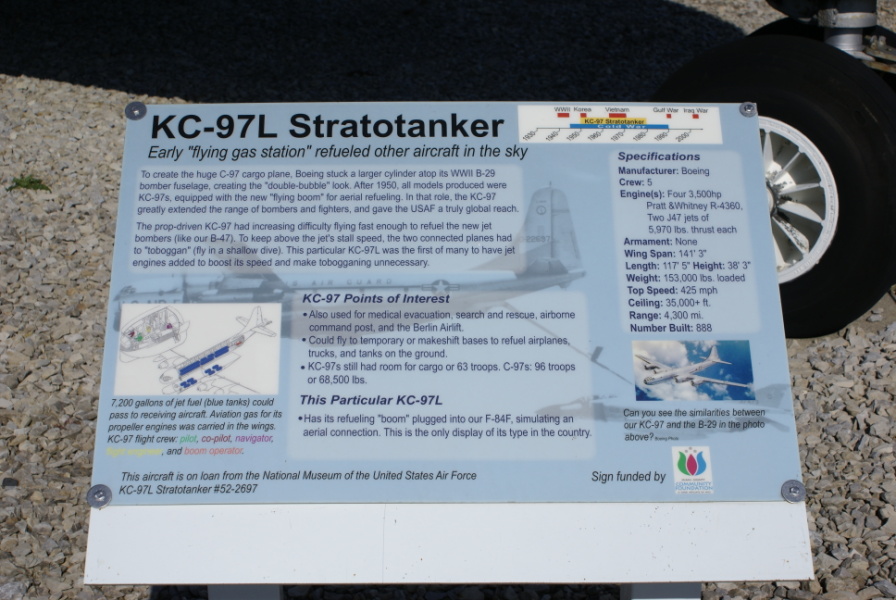| Prev |
heroicrelics.org Grissom Air Museum Site Index KC-97 Stratofreighter Gallery |
Next |
dsc58906.jpg
The sign which accompanied the plane circa 2008. It reads
KC-97L Stratofreighter
Early "flying gas station" refueled other aircraft in the sky
To create the huge C-97 cargo plane, Boeing stuck a larger cylinder atop its WWII B-29 bomber fuselage, creating the "double-bubble" look. After 1950, all models produced were KC-97s, equipped with the new "flying boom" for aerial refueling. In that role, the KC-97 greatly extended the range of bombers and fighters, and gave the USAF a truly global reach.
The prop-driven KC-97 had increasing difficulty flying fast enough to refuel the new jet bombers (like our B-47). To keep above the jet's stall speed, the two connected planes had to "toboggan" (fly in a shallow dive). This particular KC-97L was the first of many to have jet engines added to boost its speed and make tobogganing unnecessary.
KC-97 Points of Interest
- Also used for medical evacuation, search and rescue, airborne command post, and the Berlin Airlift.
- Could fly to temporary or makeshift bases to refuel airplanes, trucks, and tanks on the ground.
- KC-97s still had room for cargo or 63 troops. C-97s: 96 troops or 68,500 lbs.
This Particular KC-97
- Has its refueling "boom" plugged into our F-84F, simulating an aerial connection. This is the only display of its type in the country.
Specifications Manufacturer: Boeing Crew: 5 Engine(s): Four 3,5000 hp Pratt & Whitney R-4360,
Two J47 jets of 5,970 lbs. thrust eachArmament: None Wing Span: 141' 3" Length: 117' 5"" Height: 38' 3" Weight: 153,000 lbs. loaded Top Speed: 425 mph Ceiling: 35,000+ ft. Range: 4,300 mi Number Built: 888 This aircraft is on loan from the National Museum of the United States Air Force
KC-97L Stratotanker #52-2697
This sign refers to the plane as a Stratotanker, although I've only ever seen that moniker used with the KC-135 tanker.
Also, the sign states that the C-97 was based on the B-29, although I've generally read that it was derived from the B-50. Of course, the B-50 is basically a next-model version of the B-29 (the B-50 would probably have been the B-29D, if it weren't for post-war politics; it was easier to justify a "brand new bomber" instead of "just another WWII bomber"), but the C-97 used the same Pratt & Whitney R-4360 Wasp Major as the B-50.

| Time picture taken | Sun Oct 26 14:43:04 2008 |
| Location picture taken | Museum grounds Grissom Air Museum Peru, Indiana |
| Prev | KC-97 Stratofreighter Gallery | Next |